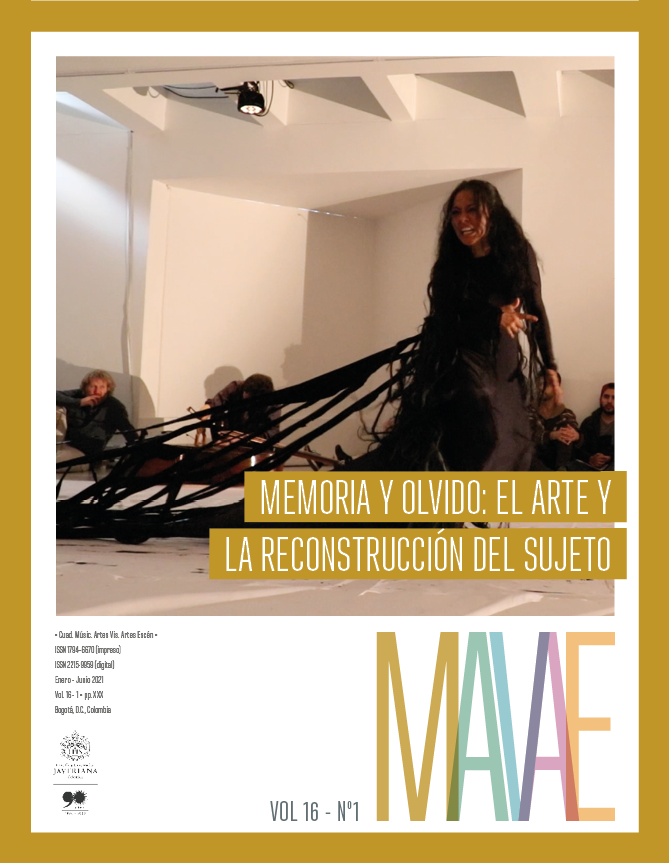Resumen
Este artículo tuvo como propósito la revisión y el estudio de la memoria visual de las prácticas travestis, transformistas y drag queens en el contexto de la Costa Caribe, en especial de Barranquilla, contrastándolas con su archivo personal, teniendo como fondo una cultura popular que las ha influido por medio de su mayor expresión: los carnavales. A través de una lectura orientada en diferentes sentidos y según espacios temáticos (eventos LGBTI, eventos del Carnaval de Barranquilla, activistas y escritores, artistas, etc.), constituyó un archivo visual expandido. Las evidencias demostraron la existencia de aproximadamente quince archivos personales/institucionales y una fuerte vinculación con su archivo personal. Asimismo, se describen las tensiones que fueron comunes en el tránsito de estas prácticas al enfrentar con resistencia el embate de diversas violencias y discriminación como la homofobia y la transfobia. El enfoque utilizado demuestra la emergencia de esta mirada en los tiempos que corren, ya que no se ha conformado un acervo sobre este tema en la región y las reivindicaciones desde los cuerpos a partir de estas prácticas no han sido visibilizadas ni reconocidas. Es desde la mirada del colectivo LGBTI y la suya propia que el autor valora, reinterpreta, reafirma y reconstruye su espacio de enunciación para hablar a otras y a otros. También propone la valoración de un legado artístico comprometido por más de treinta años que permanece libre y deseable frente a la exclusión social. Un archivo del deseo colectivo.
Almodóvar, Pedro. Mujeres al borde de un ataque de nervios. 1988; España: El Deseo, 1988.
Badawi, Halim. 2017. “La memoria rosa: Los archivos de la historia LGBTI”. Dissolve 5. Consultado: 4 de enero de 2018. http://www.dissolvesf.org/issue-5/la-memoria-rosa.
Cabrera, Marta y Marcela Gómez. 2014. “Documentos efímeros, o cómo dar cuenta de existencias invisibles: Pensando un archivo lésbico para Bogotá”. En En torno al documento, editado por Cristina Burneo Salazar, 165-177. Quito: Universidad San Francisco de Quito.
Campuzano, Giuseppe. 2008. Museo Travesti del Perú. Lima: Giuseppe Campuzano.
Castillo, Leo. 2018. “La Julieth Pantoja: Origen y evolución del Carnaval Gay”. Revista Cronopio 76. Consultado: 25 de septiembre de 2018. https://www.revistacronopio.com/?p=21264.
Castillo Vargas, Elizabeth. 2018. No somos etcétera: Veinte años de historia del movimiento LGBT en Colombia. Bogotá: Ediciones B.
Certeau, Michel de. 2000. La invención de lo cotidiano. Vol. 1: Artes de hacer. México: Universidad Iberoamericana.
Cvetkovich, Ann. 2018. Un archivo de sentimientos: Trauma, sexualidad y culturas públicas lesbianas. Barcelona: Bellaterra.
Danbolt, Mathias. 2016. “Influyendo en la historia: Relaciones de archivo en el arte y la teoría queer”. Revista Acta 1 (1). Consultado: 22 de mayo de 2018. https://dialnet.unirioja.es/servlet/articulo?codigo=6581105.
Díaz, Andrea, Nando Dorrego, Marta Sesé y Gerard Voltà. 2016. “¿Archivar es siempre radical? A propósito del ¿archivo queer?”, Revista Acta 1 (1). Consultado: 22 de mayo de 2018. https://dialnet.unirioja.es/servlet/articulo?codigo=6581098.
Fentress, James y Chris Wickham. 2003. Memoria social. Madrid: Cátedra.
Foster, Hal. 2016. “El impulso de archivo”. Nimio: Revista de la Cátedra Teoría de la Historia 3: 102-125. Consultado: 20 de mayo de 2018. http://sedici.unlp.edu.ar/handle/10915/57224.
France, David. The Death and Life of Marsha P. Johnson. 2017; Estados Unidos: Public Square Films, Ninety Thousand Words, Race Point Films, 2017.
González Cueto, Danny Armando. 2004. “Una memoria visual para el futuro: La situación de los archivos fotográficos en el Caribe colombiano”. Memorias: Revista de Arqueología e Historia desde el Caribe 1 (1). Consultado: 25 de septiembre de 2019. http://rcientificas.uninorte. edu.co/index.php/memorias/article/view/158/42.
González Cueto, Danny Armando. 2007. “Cada uno sabe su secreto: Una aproximación a la relación carnaval y homosexualidad”. Memorias: Revista Digital de Historia y Arqueología desde el Caribe 4 (8):1-3. Consultado: 30 de agosto de 2018. www.uninorte.edu.co/publicaciones/memorias/memorias_8/cine/secreto.pdf.
Guasch, Anna Maria. 2005. “Los lugares de la memoria: El arte de archivar y recordar”. Matèria: Revista internacional d’Art 5: 157-183. Consultado: 25 de mayo de 2018. https://www.raco.cat/index.php/Materia/article/viewFile/83233/112454
Guasch, Anna Maria. 2011. Arte y archivo, 1920-2010: Genealogías, tipologías y discontinuidades. Madrid: Akal.
Halberstam, Jack. 2005. In a Queer Time and Space —Transgender Bodies, Subcultural Lives. Nueva York: New York University Press.
McBane, Barbara. 2011. “A Queer Archival Impulse: Lineage: Matchmaking in the Archives” [unfinished work-in progress]. Consultado: 10 de mayo de 2018. https://cpb-us- e1.wpmucdn.com/sites.ucsc.edu/dist/e/71/files/2015/04/McBaneLineage.pdf.
Muñoz, José Esteban. 1996. “Ephemera as Evidence: Introductory Notes to Queer Acts”. Women & Performance: A Journal of Feminist Theory 8 (2): 5-16. https://doi.org/10.1080/07407709608571228.
Preciado, Beatriz, Fernando Hernández, Pere Pedrals e Ignacio Sánchez Rico. 2011. Ocaña, 1973-1983: Acciones, actuaciones, activismo. Barcelona: Polígrafa.
Ricouer, Paul. 2004. La memoria, la historia, el olvido. Buenos Aires: Fondo de Cultura Económica.

Esta obra está bajo una licencia internacional Creative Commons Atribución 4.0.
Derechos de autor 2021 Danny Armando Gonzalez Cueto


